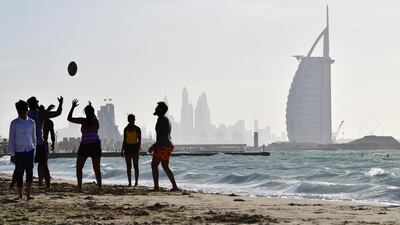The Arabian Gulf faces significant changes because of rising sea temperatures, with research showing the world’s oceans are heating up faster than earlier thought.
Dr Yves Plancherel said the geography of the region meant that its waters would be particularly susceptible to the effects of climate change.
Research by Chinese and US scientists indicate the world’s oceans are warming about 40 per cent faster than previous estimates from the Intergovernmental Panel on Climate Change suggested.
The findings, published in the journal Science, are based on an ocean observing system called Argo, which involves measurements by thousands of drifting robots around the world's seas. The robots dive every few days to record temperatures.
Dr Plancherel, an oceanographer and lecturer in climate change at the Grantham Institute, part of Imperial College London, warned that the Arabian Gulf could be particularly affected.
“The consequences in the Gulf could be quite dramatic if you have warming. It’s semi-enclosed,” he said. “Warming is going to largely stay in the basin, so it won’t benefit from the cooling of the Indian Ocean.
“You’re quite at risk of a threshold situation that will affect the sea life there quite dramatically.”
The waters off the UAE are already extremely warm, with summer sea temperatures off Dubai and Abu Dhabi averaging about 33°C, while even in winter the average sea temperature is about 21°C.
The Arabian Gulf’s waters are also set to become saltier as heat increases the rate of evaporation, Dr Plancherel said, and the region’s problem of “hypoxia”, or low water oxygen levels, is likely to become more severe and widespread.
Last year, researchers reported that the oxygen minimum zone in the Gulf of Oman, which lies between the Gulf of Hormuz and the Arabian Sea, had grown significantly.
The decline in oxygen levels in this “dead zone” is partly because warmer temperatures force bacteria in the water to use up more oxygen, making life harder for some other marine life.
Prof Andrew Watson, head of the Exeter Atmospheric and Ocean Science research group at the University of Exeter in the UK, said the rate of sea warming in the north-west Indian Ocean, which includes the Arabian Sea, was up to about 0.1°C a decade, which is close to the worldwide average. He was quoting figures from the intergovernment panel.
____________
Read more
Third of Gulf's marine life could be extinct by 2090, study finds
Could jellyfish rise in UAE be sting in the tale for climate change?
UAE’s fragile reefs will be under more strain by climate change: report
____________
Warming rates are not uniform across the planet because of factors such as changes in circulation.
“The Middle East has some of the warmest waters on the planet,” Prof Watson said. “The warmest in the world are in the Red Sea. The region is already very hot. It is going to get warmer over the coming decades.”
He said the effects of climate change were “a looming crisis” that scientists had been observing for decades.
“Looked at in the wider perspective of our tenure on this planet, it is really the stupidest thing to do to release carbon dioxide in the atmosphere at the rate we’re doing,” Prof Watson said.
Dr Plancherel said the region’s governments could help to improve the understanding that researchers have of oceanic warming by funding Deep Argo floats that can dive as deep as 6,000 metres.
“There’s an opportunity for the countries in the Gulf to take a leadership role in financing these observing systems,” he said.
The cost would be between $50 million (Dh183.6m) and $100m, Dr Plancherel said.
“There’s already an international effort, but we are doing it too slowly,” he said. “We really need to speed it up. There’s not much time to do something about this.”


